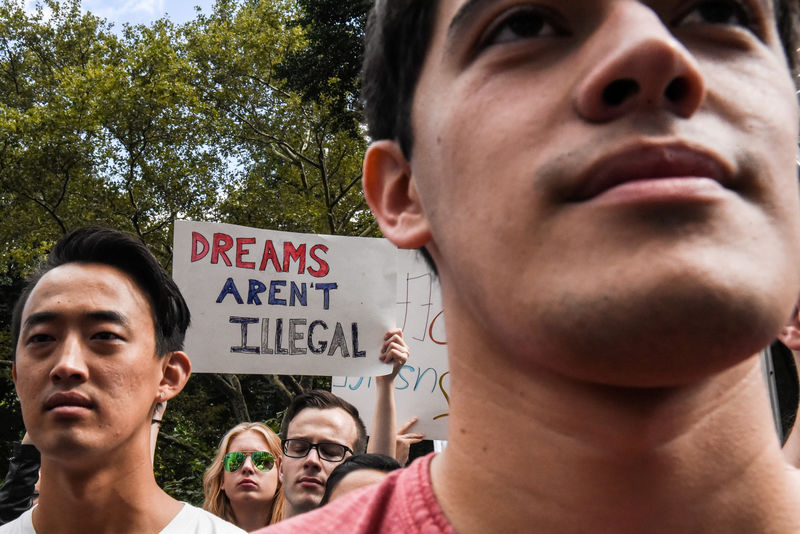By Lawrence Hurley
WASHINGTON (Reuters) - The U.S. Supreme Court in the coming days will have a last chance before its three-month summer break to decide whether to take up President Donald Trump's long-stalled bid to end a program that shields from deportation hundreds of thousands of immigrants brought to the country illegally as children.
The Trump administration on Nov. 5 asked the conservative-majority court to throw out three lower court rulings that blocked the Republican president's 2017 plan to end the Deferred Action for Childhood Arrivals (DACA) program implemented in 2012 by his Democratic predecessor Barack Obama.
The justices could have acted on the appeals as early as January but did not do so, with no reason given for the delay.
In the meantime, the DACA program remains in effect despite Trump's efforts to terminate it, part of his hard-line immigration policies that have become a hallmark of his presidency and his 2020 re-election campaign.
DACA currently protects roughly 700,000 immigrants - mostly Hispanic young adults - from deportation and provides them work permits, though not a path to citizenship. These immigrants often are called "Dreamers" based on the name of previous failed legislation intended to provide them legal status.
The justices are in the last week of their current term, which began last October, with rulings due in eight remaining cases already argued. These include closely watched disputes over the Trump administration's attempt to add a citizenship question to the 2020 U.S. census and whether limits can be set on partisan gerrymandering, a much-criticized practice in which state lawmakers manipulate electoral maps purely for partisan gain.
After the term's final rulings, the justices have one final private meeting to decide on taking new cases for their next term, starting on Oct. 7. The next such meeting is not scheduled until Oct. 1.
The legal question before the Supreme Court is whether the administration properly followed a federal law called the Administrative Procedure Act in Trump's plan to rescind DACA.
Three federal district court judges have issued orders halting Trump's move to end DACA in lawsuits challenging the move filed by a group of states, people protected by the program, rights groups and others. Trump's administration has argued that Obama exceeded his constitutional powers when he bypassed Congress and created the program.
Since the administration launched its appeal, a second regional federal appeals court ruled against Trump. The Richmond, Virginia-based 4th U.S. Circuit Court of Appeals ruled on May 17 that Trump's rescission of DACA was unlawful.
'DISCRIMINATORY MOTIVATION'
The San Francisco-based 9th U.S. Circuit Court of Appeals on Nov. 8 upheld federal judge William Alsup's January 2018 ruling against Trump, saying the challengers provided evidence of "discriminatory motivation, including the rescission order's disparate impact on Latinos and persons of Mexican heritage."
During the Supreme Court's inaction, Trump and Congress have made no progress toward reaching a deal to safeguard DACA recipients even as Democratic presidential candidates including front-runner Joe Biden pledge actions to protect the Dreamers and offer them citizenship.
If the Supreme Court takes up the matter, arguments and a ruling would come in its term that ends in June 2020, in the contentious months before the November 2020 election. If the court had agreed in January to hear it, a ruling would have been due this week, potentially a full year before a decision is now rendered.
The court could also refuse to hear the appeals or simply take no action, which would leave the lower court rulings in place and let the program remain in effect.

Trump announced his decision to rescind DACA in September 2017, planning for the Dreamers' protections to begin phasing out in March 2018. But courts in California, New York and the District of Columbia directed the administration to continue processing renewals of existing DACA applications while the litigation over the legality of Trump's action was resolved.